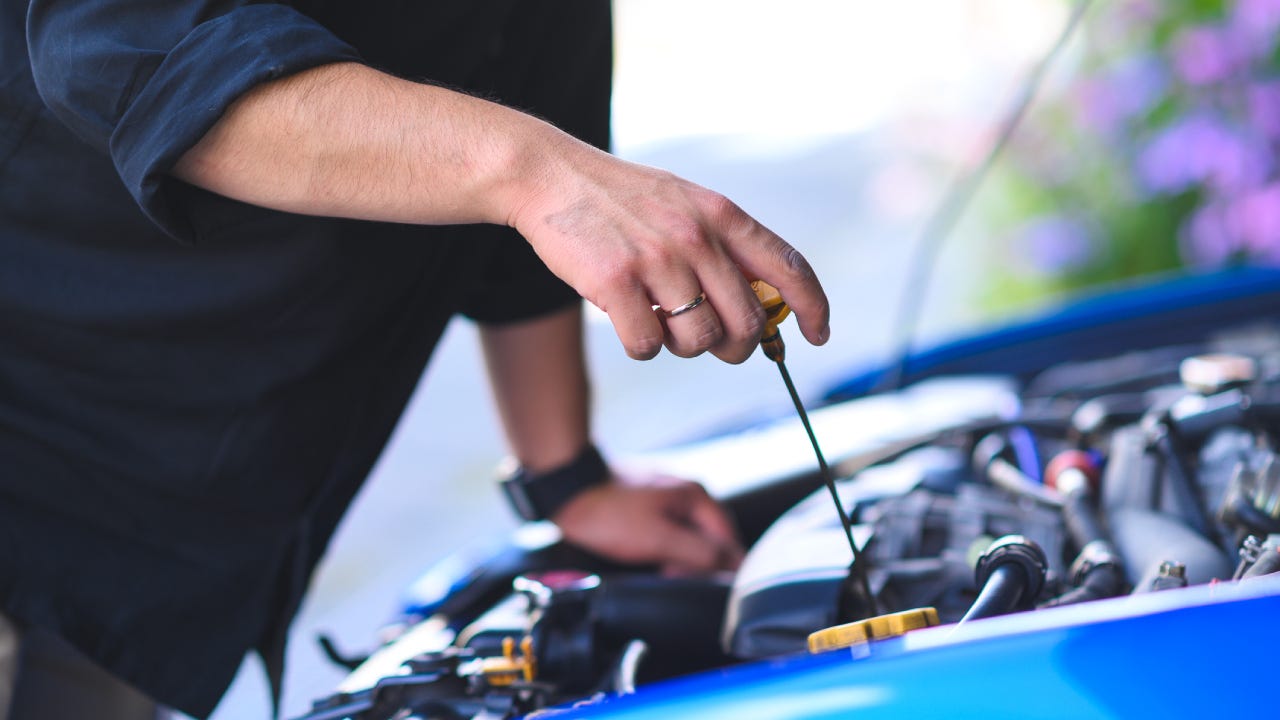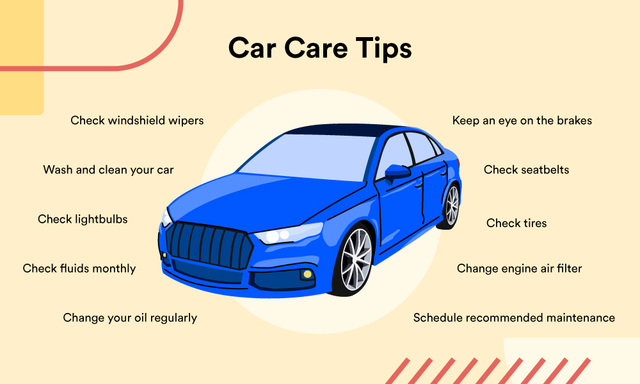Car care tips



Key takeaways
- Keeping up with your car’s maintenance can help you stop extensive — and expensive — damage in its tracks.
- It’s a good idea to take your vehicle to a mechanic for a basic inspection once per year.
- Regular maintenance can help you avoid accidents, breakdowns and other costly mishaps — which can help keep your insurance premiums level as well.
If you depend on your vehicle to get to work, shopping and more, it’s important to know how to upkeep your car, so that you can avoid emergency visits to the mechanic when one of the car’s systems fails unexpectedly. Routine maintenance may not be the most exciting aspect of owning a car, but it’s vital for your vehicle’s overall function. Bankrate’s insurance experts gathered together a list of the most important car care tips to help you avoid accidents, breakdowns and other situations that might impact your day — and your insurance premium.
How auto insurance helps with car care
Having car insurance will not prevent your car from breaking down or ensure that you will never get into an accident, but it can offer you financial protection in both of those instances. If your vehicle is damaged because of a covered claim, the insurance company can help pay to fix the damage or replace the car, depending on your level of coverage and the amount of damage.
That said, a standard car insurance policy will generally only cover the cost of repairs if they were the direct result of an accident or other vehicle mishap, such as weather-related damage or falling objects. For regular wear and tear, some providers offer mechanical breakdown insurance, or MBI, to help cover the cost of non-incident-related repairs. MBI functions similarly to a warranty and generally covers brake, drivetrain, engine, exhaust, steering and transmission repairs (to name a few).
Keep in mind that the type of auto insurance you have will also help determine whether or not repair costs are covered. A simple minimum coverage liability policy generally only covers damage to the other party’s car in an accident where you are found to be at fault. If, however, you have a more robust full coverage policy, with collision and comprehensive coverage, you may be able to file a claim with your insurer for damage you incur to your vehicle in an accident or other incident.
Taking care of your car
Although regularly taking your car to a mechanic is the best way to stay ahead of any significant repairs, there is quite a bit you can do in your own garage to help keep it in good condition.

- Check all your lightbulbs: Once a week, turn your car’s lights on to make sure no lights are burnt out. Walk around your vehicle, and do not forget about the tag lights in the back. If you spot a burnt-out bulb, you may be able to replace it yourself for just a couple of dollars.
- Wash and wax your car: A car wash does more than just make your car look good. Regularly washing and waxing removes dirt, pollen, oils, ocean and road salt and other grimy buildup from your car that can cause paint damage and rust if left untreated.
- Check fluids monthly: You should check your oil, coolant, windshield washer fluid, brake fluid, power steering fluid and differential fluid each month. With regular checks, you are more likely to spot fluid leaks before they do too much damage.
- Change your oil regularly: How often you change your oil will depend on your driving style (short vs. long trips, highway vs. city, etc.), your vehicle’s make and model and the type of oil the engine needs. During an oil change, it is also a wise idea to check your car’s battery, air filter and whether or not a wheel alignment or rotation is needed.
- Schedule recommended maintenance: Thumb through your owner’s manual to see how often certain parts in your vehicle need maintenance — and set a reminder on your calendar so you don’t fall behind. Some newer cars will also remind you when it’s time for certain routine maintenance.
- Check your windshield wipers every six months: To avoid getting caught in a downpour with a streaky windshield, check your windshield wipers every six months. Once you notice your wipers leaving streaks or foggy marks on the windshield, you should replace them.
- Change your engine air filter: Engine air filters keep dirt and other particles out of your engine so it can run smoothly and efficiently. Even if it is being checked during other maintenance appointments, inspect it at least once per year and replace it accordingly.
- Keep an eye — and an ear — on your brakes: Listen to your brakes while driving. If you notice noise coming from the brakes or feel shuddering or vibration in the pedal, set up an appointment with a mechanic.
- Check your tires: Every month, check to make sure your tires are properly inflated based on your owner’s manual recommendations. Each time your car goes in for maintenance, you should also ask the mechanic to check your tire tread depth.
- Change belts and hoses regularly: Even if your belts and hoses are in good working condition, it is still recommended that you get them replaced every two or three years, with the exception of the timing belt, which should be replaced every 60,000 miles.
In addition to the car maintenance tips we’ve outlined above, consider the following for weather-related issues that may occur throughout the year:
- Warm weather car care tips: Systems to be aware of during hot summer months include your AC, which should be monitored and serviced annually, and tire pressure, which may increase dangerously as temperatures rise. Park in the shade when you can and regularly check oil, coolant and other fluids to counter the additional strain on your engine in hot weather.
- Cold weather car care tips: Check tire pressure regularly; consider installing winter tires if you live in an area with significant snowfall. Know where your spare tire, jack and ice scraper are. Regularly visiting the car wash can help remove corrosive road salt to avoid rust. Winter fuel additives can be helpful, especially if your car runs on diesel, which tends to gel in cold weather.
Maintaining a vehicle that isn’t used often
If you own a car that isn’t used often — say, a convertible that only leaves the garage in summer, or a car that you drive only when you’re not deployed in the military — your maintenance needs may be slightly different. Letting a car sit idle for any length of time can result in issues such as a dead battery, dried-out seals or rusted brakes. Insects or rodents can also do damage.
To counter these issues, it’s important to take the car out for a drive every week or so, if possible. Even a 20-minute drive around the block or to the local shopping center is enough to keep the engine and component parts in shape.
About once a month, check the tire pressure and fluids and take a quick look at belts and hoses to ensure that there is no cracking or rodent damage. Hooking up your vehicle to a battery tender, also called a trickle charger, can help keep the battery from running down. When purchasing a battery tender, look for one with smart features that automatically shut down when the battery is charged.
If your car is in storage for any length of time, you may also save money by purchasing car storage insurance. This reduced coverage option is likely to include comprehensive insurance and your state’s minimum insurance liability coverage, but may not include collision insurance.
Average cost of popular auto repairs
AAA estimates the cost of car maintenance to be between 59 cents and $1.10 per mile. Exact repair costs will vary depending on your vehicle’s age, make and model, but here is what you can generally expect to pay for some common car repairs.
| Repair | How often | Average cost |
|---|---|---|
| Oil change | Every 5,000 to 7,500 miles | $50 to $100 |
| Tire replacement | Every six years | Varies greatly, generally $100 to $1,200 per tire |
| Tire rotation | Every 5,000 to 8,000 miles | $60 to $72 |
| Transmission service (fluid flushed and filter replaced) | Every 30,000 to 60,000 miles | $100 to $475 |
| Brake service | Every 10,000 to 20,000 miles | $200 to $500 per axle |
| Battery replacement | Every four to five years | $100 to $250 |
| Source: AAA |
Frequently asked questions
You may also like

Small size, big headaches: how to insure a tiny home



